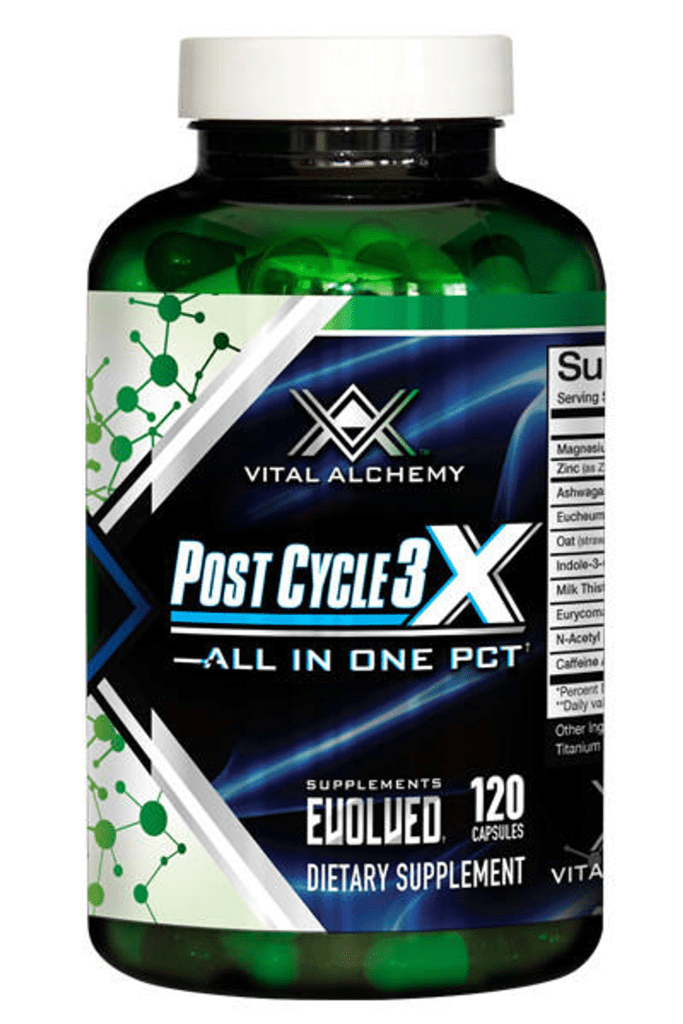The delicate equilibrium of hormones within our bodies plays a pivotal role in our overall health and well-being. These microscopic chemical messengers regulate a wide array of bodily functions, from mood and metabolism to growth and reproduction. When this intricate system is disrupted, it can have far-reaching consequences, both physically and mentally.
In the world of bodybuilding and athletic performance, as well as in medical treatments, the pursuit of optimizing physical performance and health sometimes involves interventions that can temporarily upset the natural balance of hormones. This is where Post Cycle Therapy (PCT) steps in as a crucial and often overlooked component of hormone management.
In this blog, we delve into the significance of Post Cycle Therapy, or PCT, in the realm of hormonal balance and recovery. Whether you’re an athlete using anabolics, someone undergoing a medically prescribed hormonal treatment, or simply someone interested in understanding the intricacies of hormonal health, this exploration is pertinent to you.
Hormonal Imbalance
The human body operates like a finely tuned orchestra, with various systems working in harmony to maintain equilibrium. The endocrine system, often referred to as the body’s “chemical messenger system,” plays a pivotal role in this symphony. Comprised of a network of glands, such as the pituitary, thyroid, adrenal, and reproductive glands, the endocrine system is responsible for producing and releasing hormones into the bloodstream.
These hormones act as messengers, transmitting crucial information to different parts of the body, influencing a wide range of functions. From regulating metabolism, managing stress responses, and controlling growth to affecting mood and reproduction, hormones are the invisible conductors of our bodily functions. When the endocrine system is functioning optimally, the body maintains a state of balance and health. However, disruptions in this system can lead to hormonal imbalances, which can have far-reaching effects on one’s physical and mental well-being.
Post Cycle Therapy
Post Cycle Therapy (PCT) is a structured approach to managing hormonal imbalances that can occur as a result of various factors, including the use of prohormones, certain medical treatments, or the body’s own inability to regulate hormone levels. The primary purpose of PCT is to restore hormonal equilibrium and minimize the adverse effects associated with hormonal imbalances.
When an individual undergoes a regimen that alters their natural hormonal balance, such as using prohormones in bodybuilding or receiving certain medical treatments, the body’s endocrine system may struggle to regain its natural balance once the regimen is completed. PCT serves as a strategic intervention to aid the body in re establishing its hormonal equilibrium.
Different Contexts Where PCT is Utilized
Post Cycle Therapy is employed in various contexts, with two of the most common being in the realm of bodybuilding and in medical treatments:
- Bodybuilding and Athletic Performance: In the world of bodybuilding, athletes often turn to prohormones to enhance muscle growth and physical performance. While these products can produce remarkable short-term gains, they can also lead to significant disruptions in natural hormonal balance. Bodybuilders use PCT as a means to help their bodies recover and regain hormonal equilibrium after completing a cycle. This not only minimizes the risk of unwanted side effects but also helps maintain the hard-earned gains.
- Medical Treatments: PCT is not limited to the fitness and bodybuilding community. It also plays a crucial role in medical treatments, such as hormone replacement therapy (HRT) for individuals with hormonal deficiencies or imbalances. In the medical context, PCT helps patients transition smoothly between different phases of treatment, ensuring minimal disruptions in hormone levels and minimizing potential side effects.
The Core Objectives of PCT in Restoring Hormonal Balance
Post Cycle Therapy has several key objectives aimed at restoring hormonal balance and optimizing overall health:
- Hormone Rebalancing: The primary goal of PCT is to help the body reestablish its natural hormone levels. This may involve stimulating the production of hormones that have been suppressed or, in some cases, inhibiting the production of excess hormones.
- Minimizing Side Effects: PCT is designed to mitigate the potential side effects associated with hormonal imbalances, such as mood swings, loss of muscle mass, or metabolic disturbances. By swiftly restoring equilibrium, PCT helps minimize these adverse effects.
- Preserving Gains: In the context of bodybuilding and athletic performance, PCT helps preserve the muscle gains achieved during a cycle of anabolic use. Without proper PCT, the rapid loss of muscle mass is a common issue post-cycle.
- Supporting General Health: Beyond the context of specific treatments or bodybuilding, PCT contributes to general health by preventing the development of long-term health issues related to hormonal imbalances, such as diabetes or cardiovascular problems.

Why PCT Matters for Hormonal Recovery
The decision to skip or neglect Post Cycle Therapy (PCT) can carry significant risks, particularly for individuals who have disrupted their hormonal balance through anabolic cycle use or other medical treatments. Here are some of the risks associated with not implementing PCT:
- Hormonal Imbalance Persists: Without PCT, the body may struggle to regain its natural hormonal balance. This can lead to ongoing disruptions in hormone levels, which may result in persistent adverse effects on physical and mental health.
- Loss of Gains: In the context of bodybuilding, the rapid loss of hard-earned muscle mass and strength is a common consequence of skipping PCT after anabolic use. This can be disheartening and demotivating for athletes who invest significant time and effort into their training.
- Increased Side Effects: Hormonal imbalances can manifest in a range of side effects, including mood swings, fatigue, and sexual dysfunction. Failing to address these imbalances through PCT can result in the exacerbation of these side effects.
- Long-Term Health Consequences: Prolonged hormonal imbalances can contribute to the development of more serious health issues. For example, imbalances in insulin and glucose regulation can increase the risk of diabetes, while ongoing disruptions in lipid metabolism may lead to cardiovascular problems.
How PCT Aids in Minimizing Hormonal Disruptions
Post Cycle Therapy serves as a valuable tool for minimizing the disruptions associated with hormonal imbalances. Here’s how PCT achieves this:
- Rebalancing Hormones: PCT involves the use of medications and or supplements that help stimulate or inhibit the production of specific hormones, depending on the individual’s needs. By doing so, it aids in reestablishing a state of hormonal equilibrium.
- Gradual Transition: PCT facilitates a gradual transition from one hormonal state to another. This gradual approach minimizes the shock to the body’s systems and allows for a smoother, less disruptive recovery process.
- Preservation of Muscle Mass: In bodybuilding and athletic contexts, one of the primary goals of PCT is to preserve the muscle gains achieved during a cycle of anabolic cycle use. By supporting muscle retention, PCT helps maintain the physical progress made during the cycle.
- Optimizing Well-Being: Beyond its physical benefits, PCT also contributes to mental and emotional well-being. By reducing mood swings, fatigue, and other psychological effects of hormonal imbalances, it promotes a sense of stability and overall health.
The Role of PCT in Preventing Long-Term Health Issues
A less-discussed but equally critical aspect of PCT is its role in preventing the development of long-term health issues. By addressing hormonal imbalances promptly, PCT significantly reduces the risk of serious health problems, including:
- Metabolic Disorders: PCT can help prevent the onset of metabolic disorders like diabetes by restoring insulin sensitivity and glucose regulation.
- Cardiovascular Complications: Ongoing hormonal imbalances can lead to lipid metabolism issues, which are linked to an increased risk of cardiovascular problems such as heart disease and hypertension. PCT helps mitigate this risk.
- Fertility and Reproductive Health: In both men and women, untreated hormonal imbalances can impact fertility and reproductive health. PCT plays a crucial role in restoring normal reproductive function.
The Components of an Effective PCT
A successful Post Cycle Therapy (PCT) regimen is built on several essential elements that work in synergy to restore hormonal balance. Here is an overview of these key components:
- Timing and Duration: PCT should be initiated at the right time, taking into consideration the specific compounds used and the duration of the cycle. Generally, it begins shortly after the completion of the primary treatment and may extend for several weeks.
- Medications and Supplements: PCT incorporates the use of specific medications and supplements designed to stimulate or inhibit the production of hormones, depending on the needs of the individual.
- Blood Work and Monitoring: Regular blood tests and monitoring are crucial for assessing hormone levels and ensuring that the PCT regimen is effectively restoring balance. Adjustments can be made as needed based on these assessments.
- Nutrition and Lifestyle: Maintaining a healthy diet and lifestyle is integral to supporting hormonal recovery. This includes proper nutrition, adequate sleep, stress management, and exercise.
- Hydration and General Health: Staying well-hydrated and addressing any underlying health issues or deficiencies are also important aspects of PCT.
Medications and Supplements Commonly Used in PCT
PCT typically involves the use of specific medications and supplements to facilitate the rebalancing of hormones. The choice of compounds may vary based on individual circumstances, but common ones include:
- Selective Estrogen Receptor Modulators (SERMs): Medications like tamoxifen and clomiphene are often used in PCT to block the effects of estrogen on certain tissues, promoting natural testosterone production.
- Aromatase Inhibitors (AIs): These compounds, such as anastrozole, are employed to control estrogen levels. Elevated estrogen can be a concern in some hormonal treatments.
- Human Chorionic Gonadotropin (hCG): hCG is used to stimulate the testes to produce testosterone, particularly when testicular atrophy has occurred during anabolic cycle use.
- Supplements: Various supplements, such as vitamin D, zinc, and omega-3 fatty acids, ALA, hawthorn berry, fenugreek, are often recommended to support overall health and hormone production.
- Anti-Cortisol Medications: In cases of high stress or cortisol levels, medications to reduce cortisol, such as mifepristone, may be utilized.

Benefits of Properly Executed PCT:
- Restored Hormonal Balance: PCT helps the body regain its natural hormonal equilibrium, particularly after treatments or cycles that may have disrupted this balance. This restoration is essential for overall health and well-being.
- Enhanced Well-Being: Properly executed PCT stabilizes mood, emotions, and mental well-being, reducing mood swings, irritability, and symptoms of depression that can result from hormonal imbalances.
- Improved Sexual Function: PCT contributes to the restoration of healthy sexual function and libido, enhancing the overall quality of life.
- Minimized Adverse Side Effects: By managing hormone levels, PCT reduces the risk of side effects associated with hormonal imbalances, such as gynecomastia and sexual dysfunction.
- Metabolic Health: PCT helps maintain insulin sensitivity and regulate lipid metabolism, reducing the risk of metabolic disorders like diabetes and cardiovascular complications.
- Muscle Preservation: In the context of bodybuilding, PCT preserves hard-earned muscle gains, preventing significant muscle loss that can occur without proper post-cycle therapy.
- Faster Recovery: PCT facilitates a smoother transition from a treated hormonal state to a natural equilibrium, allowing individuals to return to their regular activities and routines more quickly.
- Emotional Stability: Emotional and mental stability fostered by PCT can boost confidence and motivation, positively impacting sports, work, and everyday life.
- Long-Term Health: PCT plays a crucial role in preventing the development of long-term health issues, such as diabetes and cardiovascular problems, providing reassurance about future health.
- Continued Progress: For athletes and bodybuilders, top 5 post cycle therapy supplements ensure that muscle gains achieved during a cycle are preserved, allowing for a seamless transition into the next phase of training and improvement.
End Note
Post Cycle Therapy is not just a supplementary concept; it’s an integral component of hormonal management, impacting overall health and well-being. Properly executed PCT restores hormonal balance, enhances well-being, minimizes side effects, maintains metabolic health, and preserves muscle gains. It offers a smoother recovery and a sense of emotional stability, contributing to long-term health and the continuation of progress. Understanding the significance of PCT is the first step in embracing its benefits and promoting optimal health and performance.
Disclaimer
This website is for information purposes only. We neither give any copyrighted material nor plump pirating through any composition on this website. nonetheless, the news and details we give are fluently available each over the internet.
| JOIN TELEGRAM | CLICK HERE |
| JOIN OUR TWITTER NEWS | CLICK HERE |
| FOLLOW ON TUMBLR | CLICK HERE |
| SEND FRIEND REQUEST OUR FB ACCOUNT | CLICK HERE |
| OKEEDA HOMEPAGE | CLICK HERE |
Okeeda covers latest news and breaking events across the globe, providing information on the topics including sport, entertainment, India and world news, viral, tech, auto etc.



